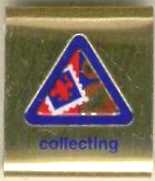This subject was added in 2002.
Requirements
Tiger Cubs, Cub Scouts, and Webelos Scouts may complete requirements in a family, den, pack, school, or community environment. Tiger Cubs must work with their parents or adult partners. Parents and partners do not earn loops or pins.
Belt Loop
Complete these three requirements:
- Begin a collection of at least 10 items that all have something in common. Label the items and title your collection.
- Display your collection at a pack or den meeting.
- Visit a show or museum that displays different collections
Academics Pin
Earn the Collecting belt loop, and complete five of the following requirements:
- Give a talk about your collection to someone other than your family. Give a description of your collection, including a short history. Explain how you got started and why you decided to collect what you do.
- Show how you preserve and display your collection. Explain any special precautions you must take including handling, cleaning, and storage. Note precautions for dampness, sunlight, or other weather conditions.
- Read a book about what you collect.
- Start a new collection of at least 20 items. Label the items, and title your collection.
- Define numismatics and philately.
- Join a club of collectors who share your hobby. This club may be a group of your friends.
- Find out if there is a career that involves what you collect. Find out what kind of subjects you need to study to prepare for such a career.
- If you collect coins or stamps, make a list of different countries in your collection. Explain how to identify each country's issues. Make a list of "clues" that help you identify the origin.
- With an adult partner, visit an online auction and look for items you collect. What does it tell you about rarity and value of the things you collect?
- Use a computer to catalog, organize, and keep track of your collection.
- Help a friend get started on a collection of his or her own.








